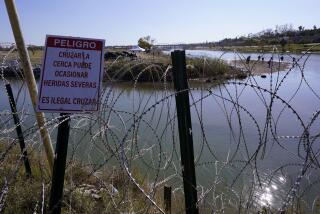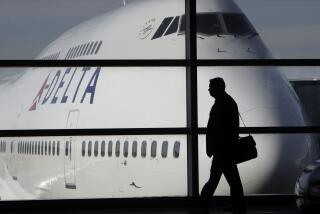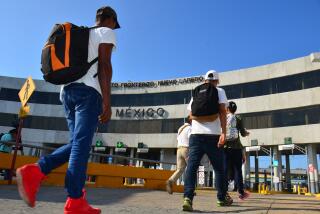Security Highest Ever at Airports
WASHINGTON — Responding to a heightened threat of terrorists commandeering commercial aircraft from overseas, U.S. and foreign officials in the last two weeks have boosted security at airports at home and abroad to its highest level yet, government officials said Thursday.
“There is a higher level of security domestically, and also with our international partners, than there ever has been,” said Brian Roehrkasse, spokesman for the Department of Homeland Security.
British Airways canceled two flights between London and Washington on Thursday, and Aeromexico canceled a flight from Mexico City to Los Angeles International Airport on Thursday night.
The increased security has affected a number of other flights in recent days:
* British Airways Flight 223 from London to Washington was escorted by U.S. fighter jets and then detained on the tarmac at Dulles International Airport near Washington for several hours Wednesday night while passengers and luggage underwent additional screening. The same flight was canceled Thursday, as was the return flight.
* Aeromexico Flight 490 bound for LAX from Mexico City on Wednesday night was canceled because of security concerns. In this case, and in the case of the British Airways flights canceled Thursday, the decision was made by the airline or government in the country where the flights originated, based on intelligence gathered by American operatives and shared with the foreign governments, a U.S. government official said.
Counterterrorism officials said Thursday that Aeromexico Flight 490 on New Year’s Eve was of particular concern because it, like Air France Flight 68 from Paris to LAX last week, had been identified in intelligence reports as a possible target of Al Qaeda. Aeromexico 490 was also canceled Thursday night.
* An Aeromexico plane from Mexico City on Christmas Eve turned around after about 15 minutes because a Transportation Security Administration inspector on the ground did not believe passengers had been adequately screened, according to the airline and a senior administration official. After rescreening, Flight 494 and its passengers headed to LAX.
The incidents show some of the effects of tightened anti-terrorism measures at airports around the world.
Behind the scenes, agents have been scrambling to check passenger manifests against databases of known or suspected terrorists, additional air marshals are flying on foreign flights headed to the U.S., and Transportation Security Administration inspectors based in airports in most major cities around the world are scrutinizing the screening of passengers and luggage headed for America.
Officials have not reported making any arrests or discovering any suspicious items as a result of the additional security measures or in connection with any of the detained or canceled flights. Counterterrorism officials with the FBI and other U.S. agencies, however, have expressed the belief that the extraordinary security measures, particularly with Air France Flight 68, may have averted terrorist attacks.
The measures are all part of an increased security posture driven by a volume and specificity of terrorist “chatter” in recent weeks that FBI and other government officials have described as unprecedented. “I have never seen people so scared as when we went to this alert,” one senior government official said late Thursday.
Since Dec. 23, the Department of Homeland Security has placed the nation’s law enforcement agencies on high, or orange, alert, the second-highest level in the system established after Sept. 11. It remains unclear how long that increased security level will last, with senior U.S. officials privately saying it could continue for at least another week to another month or more.
The increased security has occurred on a variety of fronts.
In Las Vegas, for example, it was learned Thursday that U.S. officials have issued subpoenas and FBI national security letters within the past two weeks so agents can review the hotel registers and airline passenger lists in one of the world’s busiest tourist locations. The action was taken, sources said, because Las Vegas was one of several cities mentioned in recent terrorist alerts, rather than because authorities had any reason to suspect terrorists were actually in the city.
“We wanted to see who was coming in and who was staying where,” said the senior government official.
“It was done out of an abundance of caution,” the official said. “We are at a heightened state of alert and have some very specific threats. And the names of some cities have come up, so we cannot take any chances.”
(Federal authorities in Los Angeles had previously taken similar steps to obtain records of passengers for several airlines, since the terrorism alerts also singled out Los Angeles as a possible target.)
The exceptional precautions are being taken because intelligence agents have intercepted a larger volume of threats suggesting that terrorists are planning coordinated attacks by using commercial jets like the Sept. 11 hijackers used in the attacks on New York and the Pentagon. The threats have focused on specific routes, such as Mexico City to LAX, Paris to LAX, and flights originating in London and bound for various U.S. destinations.
In the case of the British Airways plane that was detained at Dulles on Wednesday evening, credible threat information led analysts to have concerns about that specific route, the senior administration official said.
That concern also led to the decision Wednesday to use fighter jets to escort the plane to its landing at Dulles, said Jennifer Marty, spokeswoman for the Transportation Security Administration, which is part of the Department of Homeland Security. The jet was kept far from the terminal while passengers were required to show identification and luggage was screened, Marty said. The plane landed a little after 7 p.m. Wednesday, but FBI agents were still talking to some “folks of interest” as late as 2 a.m. Thursday, Marty said.
No one was arrested, officials said.
In the end, “everything checked out,” Roehrkasse said.
British Airways spokesman Leo Seaton said the decision to cancel Flight 223 on Thursday was made based on the advice of the British government, which warned of security concerns. Forty-one of the 180 passengers scheduled to take the earlier flight from Heathrow Airport were put on the next flight to Washington. The rest were booked on other flights, Seaton said. He was not aware of security personnel interviewing any passengers as they checked in for the flight.
As of Thursday evening, he said, there were no plans to cancel any other flights. But the British Airways reservations line reported that Flight 223, the return flight from Washington, D.C., to London, also was canceled Thursday for “operational reasons.”
In London, British officials would say only that the earlier flight was scratched for “security reasons.” A Department of Transport spokeswoman refused to elaborate, saying the government does not publicly comment on security matters.
Seaton said British Airways officials were “very frustrated” at the lack of information they were receiving from the British government about the reasons for grounding the flight. “Whatever information we’ve had at that top level indicates it is terrorism-related,” Seaton said. “But the scale and the detail is not there.”
In the case of Aeromexico 490 on Wednesday evening, there were credible threats that the route might be targeted and special concerns that New Year’s Eve might be a particularly risky night, said the senior administration official, speaking on condition of anonymity.
After security analysts checked the flight roster against a number of different databases, they had concerns that a few passengers may have had links to terrorist activities, the official added.
The passengers boarded the flight before it was canceled, so U.S. and Mexican officials were able to interview those who had sparked their interest, the official said. No one was arrested, and many, possibly all, of the passengers boarded a later flight to Los Angeles.
Last week, federal agents may have missed the chance to talk to some passengers on Air France flights between Paris and LAX because several flights were canceled in advance at once, possibly tipping off some suspected terrorists before they went to the airport. U.S. intelligence officials believed that as many as a dozen passengers on two Christmas Eve flights might have been Al Qaeda or Taliban terrorists.
Two FBI officials said Thursday that the Air France flights were of special concern to the U.S. because names similar to those of Islamic militants were found on the lists of passengers for two flights, including Flight 68.
By contrast, they said, authorities were concerned about Aeromexico Flight 490 because that flight had been specifically identified in intelligence reports as a potential target on New Year’s Eve and New Year’s Day. And while the names of several passengers on the New Year’s Eve flight did pique the interest of investigators, none rose to the level of concern associated with the passengers ticketed on the Air France flights last week, the officials said.
In a statement issued Thursday night, the U.S. Embassy in Mexico said the two governments “have worked closely in recent days to [ensure] the safety and security of our citizens in light of the recent threats to aviation.”
The statement added that U.S. and Mexican authorities jointly decided “it was in the interest of both our countries” to cancel the Aeromexico Flight 490 on New Year’s Eve and New Year’s Day “on the basis of credible intelligence information” regarding security.
Thursday night’s flight, scheduled to depart at 6:55, remained on the ground until 8, when 185 passengers were told that the flight had been canceled. Authorities interviewed passengers, but no arrests were made and no suspicious luggage was found, according to Mexican and airline officials. All the passengers were transferred to other flights, according to the airline.
Presidential spokesman Agustin Gutierrez Canet said the Mexican government made the decision to cancel the flights at the request of the U.S. government. “It’s important that there be a clear explanation and that these security measures be based on clear rules,” he said. “The Mexican government is cooperating fully with the United States on airline security and will continue to do so. But we in the Mexican government, Aeromexico and its passengers deserve an explanation.”
FBI officials said last week’s decision to turn back Aeromexico Flight 494 was not based on any specific tip or alert to the FBI about a terrorist attack.
A representative of Aeromexico offered a similar explanation Thursday about the flight. “It was called back because U.S. authorities were not satisfied that security procedures were followed,” said Carmen Gonzalez.
Airports were not the only transportation terminals affected by terrorism concerns over the holiday weekend.
The oil tanker terminal in Valdez, Alaska, was closed Tuesday night to safeguard against potential terrorist attacks. The terminal, where tankers load oil from the Trans Alaska Pipeline, remained closed until Thursday night, the Coast Guard said.
“Right now we are allowing tanker traffic throughout the port,” Lt. Latarsha McQueen of the Coast Guard’s Valdez Marine Safety Office said Thursday night. “Appropriate safety measures are being taken with regard to the security information that we have.”
Last week, security was strengthened in the Prince William Sound community after U.S. officials said Al Qaeda operatives could target remote sites such as oil facilities in Alaska.
*
Times staff writer Richard Boudreaux in Mexico City and special correspondent William Wallace in London contributed to this report. Shogren reported from Washington and Krikorian from Los Angeles.
More to Read
Sign up for Essential California
The most important California stories and recommendations in your inbox every morning.
You may occasionally receive promotional content from the Los Angeles Times.









